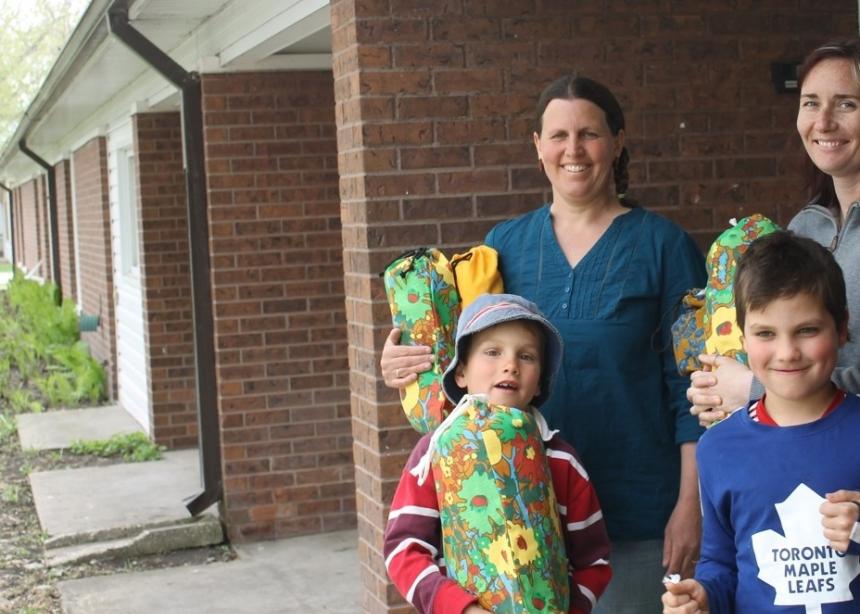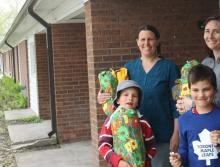“The world has come to Gretna,” says Robin Neustaeter, a resident of the normally quiet town of 550 on the border between Manitoba and the U.S. On May 4, 2017, Manitoba’s Conservative government opened a “reception centre” in Gretna to provide temporary housing for asylum seekers who walk across the border in the area.
On the first Sunday the centre was open, six asylum seekers from Cameroon and Nigeria attended the local Mennonite church. Co-pastor Jana Wiebe says many in the congregation found it “energizing.”
One man had lost his shoes on the walk into Canada and was determined to get shoes by that Sunday so he could attend church. He felt he needed to go to church to thank God he was in Canada.
Also in attendance were a couple with three young children, the oldest a 7-year-old boy with cerebral palsy. The dad had carried the boy on their 14-hour walk into Canada. He held his son throughout the service. Wiebe says it was “heartwarming and heartbreaking.”
Wiebe looks forward to seeing who else may attend in coming weeks. She expects church members will go to the centre each Sunday to extend an invitation. Community members are welcome to visit the common room at the centre, which is a formerly unused seniors housing complex.
While media are not permitted, I visited—without notebook or camera—along with several people from Pembina Mennonite Fellowship, including my wife and sons, who were delivering hygiene kits. Inside, a dozen people were eating a lunch that had been brought in. Two men chatted with the security guard. The mood was relaxed.
Asylum seekers are brought to the centre directly from the Canada Customs office, where their initial processing and security screening takes place. They stay for two to five days, until arrangements can be made for housing in Winnipeg.
While there have been concerns in the community, Gretna is showing hospitality.
“People are bringing them rollkuchen,” Neustaeter says. In the church lobby is a list of the items needed at the centre, including baby strollers and toys.
Students at Mennonite Collegiate Institute in town are also keen to connect. They are gathering supplies, baking and hoping to spend time hanging out with kids.
“I am pleased our kids are excited about this,” says principal Cheryl Braun.
Wiebe, Braun and Neustaeter all draw a comparison with Mennonite history. “We have our own story of immigration,” says Neustaeter. “At some point, these people were us.” Braun, whose parents immigrated to Canada, notes that not everyone was pleased to see Mennonites when we arrived.
“How could we not help?” Wiebe wonders, in reference to our history and faith. “Jesus said to welcome the stranger, clothe the naked and feed the hungry.” For her, it is important to “live out of a place of faith rather than fear.”
llegal queue-jumpers straining the system
Wiebe, Braun and Neustaeter speak respectfully about tensions in Gretna and beyond. Legality is one concern. Tim Wichert, a Mennonite immigration lawyer from Virgil, Ont., says “a legal conflict” exists. While it is not lawful to cross a border other than at a port of entry, Canadian law and international law make provisions for people who face persecution at home to do what these asylum seekers do.
The Safe Third Country agreement with the U.S., which requires people to make a refugee claim in the first “safe” country they reach, does not apply to people who arrive from the U.S. by sea, at an airport or between ports of entry.
This is an established legal process, although the odd need to sneak across the border adds a shadowy character to it.
As for “queue-jumping,” Wichert says, “If someone is in danger, and has a legitimate refugee claim, then that person should have their claim considered on its merits. That’s an international obligation, and part of an international legal [and moral] regime that says we need to protect refugees.”
While many Canadians are more familiar with cases of refugee claimants being processed overseas, walking across a border is another legitimate track.
Understandably, some Canadians ask whether the people coming over face significant danger of deportation from the U.S. Many of the asylum seekers are Somali. A Somali man at the centre the day I visited noted that 90 Somalis have been deported in 2017 and seven of those ended up dead. Although I was unable to verify the second figure, the fear is real.
U.S. officials have said 4,801 Somalis in the U.S. are subject to “final orders of removal,” although that does not mean they will all be deported. Last November in Minneapolis, Minn., then-candidate Donald Trump referred to Somali refugees in the state as a “disaster.”
The risk of deportation is not new. Former president Barack Obama deported more people than any other president. As of the end of April, 575 people had made refugee claims in Manitoba this year, equalling the number for all of 2016. Nationally, about 12,000 people made refugee claims in the first four months of 2017, compared to about twice that many in 2016.
Not all those who cross the border will get to stay. Neustaeter says that roughly two-thirds of all refugee claims in Canada are successful, meaning they are deemed by a refugee board to be people with a well-founded fear of persecution in their home country or otherwise in need of protection.
Another concern is that these people are a “drain on the system.” Like most money questions, this boils down to priorities. Is it a societal priority to extend benefits—at real cost—to a segment of people among whom two-thirds are fleeing persecution? Views differ.
Stepping back, Neustaeter sees bigger questions. “Why,” she asks, “do people have to leave their homes?”
Meanwhile, she goes to the reception centre several times a week with her young daughter. “They’re humans just like you and me,” she says. “They are just so happy to find a safe place.”




Add new comment
Canadian Mennonite invites comments and encourages constructive discussion about our content. Actual full names (first and last) are required. Comments are moderated and may be edited. They will not appear online until approved and will be posted during business hours. Some comments may be reproduced in print.